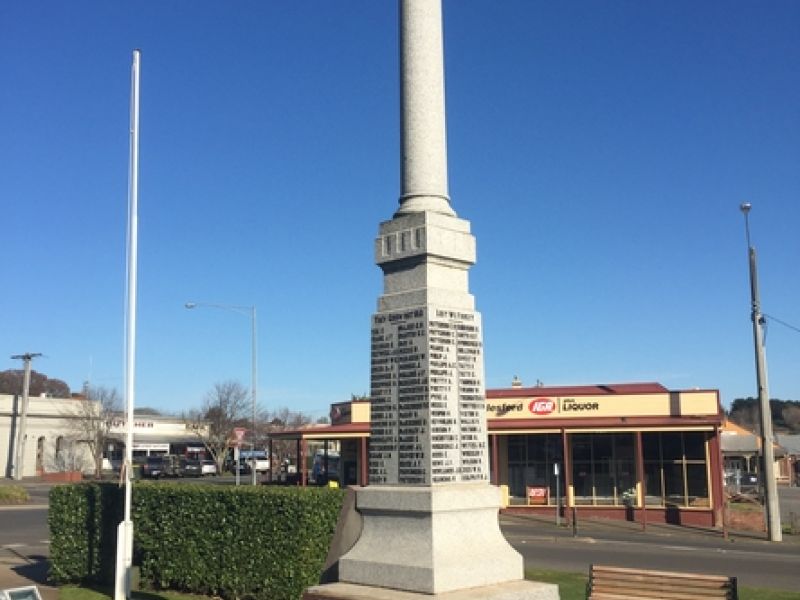Consecrating the Cenotaph
Daylesford Cenotaph Les Pitt
On 19th July 1929, Daylesford Borough Council agreed to take over the fundraising for a war memorial from the RSL. For a number of years the RSL had been trying to raise the £600 required, but felt unable to complete the job, so handed it over to the councillors.
One councillor suggested that a lookout tower be built on Wombat Hill, another thought that entrance gates could be built to the new lake which was in the process of filling, and another suggested gates to Wombat Hill Botanic Gardens. It was also mentioned that the adjoining town of Hepburn Springs wanted their own memorial.
Councillor J.C Pollock was the first to suggest a simple obelisk in Burke Square. The options were discussed many times before it was agreed on, the suggestion by Councillor Pollock turning out to be the popular winner.
During 1929 tenders were called for the design and stonework to be used for the then WW1 Soldiers Memorial obelisk. In due course this was won by the Daylesford stonemason George Place.
In June, the RSL received confirmation from Brigadier Harold 'Pompey' Elliott that he would be at the unveiling on August the 3rd. Brigadier Elliott was the commander of the 15th Brigade, a very popular leader, who was affected by witnessing many of his men being slaughtered at some of the battles in France, particularly at Fromelles.
In July in a letter received by the Advocate, it was asked whether the 3rd August was a suitable date due to the chance of bad weather, and the other asking whether the organising committee was organised enough to get things right by 3rd Aug. In due course the ceremony was postponed to a more auspicious day - the 11th November.
The Advocate announced on the 7th November that the ceremony would be of 'a religious nature' and after the ceremony the official party would travel to Hepburn to open their Memorial in a civic ceremony.
Brigadier Elliott arrived on the 11th November and duly gave his speech and the ministers said their prayers and thus prevented a 'pagan obelisk' being installed in Burke Square.
The Advocate on the 14th November reported on Elliott’s speech at the Hepburn memorial. Chaplain Captain Yeo had also spoken at the service and remarked that 'war is degrading, brutalising and devastating and should be avoided at all costs'.
Elliott then gave his speech, disagreeing strongly with Yeo and stating his view that lessons could be also learned, namely devotion to duty at all costs, and the willingness to save our fellow man. He mentioned two instances of bravery, one at Gallipoli and one in France.
Elliott was one of many mentally damaged by the war, and he committed suicide less than four months later.
 Daylesford and District Historical Society
Daylesford and District Historical Society